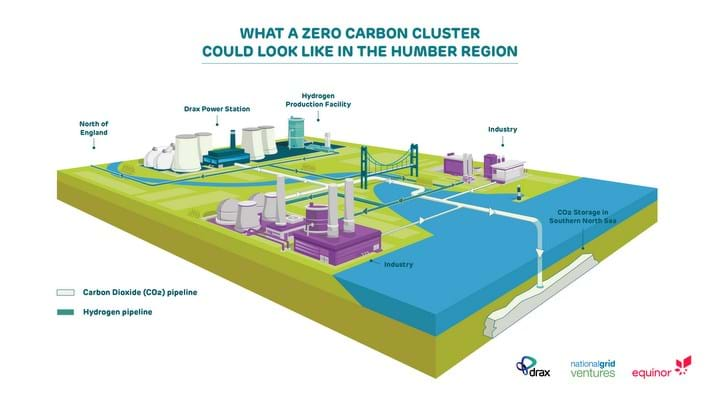Partners sign MoU for CCUS and hydrogen production in the Humber

DRAX, Equinor, and National Grid Ventures have signed an MoU to investigate construction of a large-scale carbon capture usage and storage (CCUS) network and a hydrogen production facility in the Humber, UK in the mid-2020s. The partners aim to create a “net-zero” carbon cluster in the North of England.
The partnership represents the first significant step by industry since the recent publishing of the UK Committee on Climate Change’s (CCC) report, Net Zero, which recommended a target of net-zero emissions by 2050. It found that development of CCUS and hydrogen technology in regional industrial clusters is essential if the UK is to achieve a net-zero carbon economy by 2050.
The project could make the UK’s largest area of industrial emitters a world-first “net-zero” carbon cluster by the 2030s. It could also make the region home to a new world-leading hydrogen economy.
In addition, the project could create a carbon capture transport network for industrial emissions, which would permanently store carbon dioxide (CO2) under the North Sea and deliver hydrogen at scale to the region. The cluster would include the world’s first carbon negative power station and a low-cost hydrogen economy.
The companies will work together to:
- Explore the potential scale-up of the bioenergy carbon capture and storage (BECCS) pilot project at Drax Power Station, the UK’s biggest renewable power generator. BECCS combines combustion of biomass to generate energy with carbon capture and storage. The partners aim to create the world’s first carbon negative power station in the mid-2020s.
- Explore the potential development of a large-scale hydrogen demonstrator at the Drax site by as soon as the mid-2020s. This would be in line with the CCC’s recommendation to produce hydrogen at large scale in at least one industrial cluster by 2030.
- Explore strategic opportunities to develop a cutting-edge hydrogen economy in the region.
Drax’s BECCS – the first of its kind in Europe – began capturing CO2 earlier this year. It captures 1 t/d of CO2. A scale-up of the project could act as an “anchor” for a regional CCUS network that could capture millions of tons of industrial CO2 emissions from nearby facilities, annually.
The partners plan to publish a study outlining the technical, economic, and societal opportunities for CCUS and hydrogen in the Humber later this year.
Will Gardner, Drax Group CEO, said: “The Committee on Climate Change was clear – the UK needs both bioenergy with CCS and hydrogen production at scale by 2030 to achieve a ‘net-zero’ carbon economy. This partnership is committed to meeting this challenge putting Great Britain at the heart of the global energy revolution.
“With Drax’s carbon negative power station, the Humber region could lead the world in new technologies that can deliver for the climate and the economy, helping to create a cleaner environment for future generations whilst creating new jobs and export opportunities for British businesses.”
Irene Rummelhoff, Executive Vice President of Marketing, Midstream, and Processing at Equinor, said: “Globally we must see substantial decarbonisation of industry and energy in the years ahead, and we believe CCS and hydrogen must play a significant role in this.”
Jon Butterworth, Chief Operating Officer of Global Transmission at National Grid Ventures, said: “We have seen rapid progress in decarbonising energy through established technologies such as wind power, solar and electricity interconnectors. CCUS and hydrogen create a new pathway to greater decarbonisation of the energy system and provide a platform for decarbonising other areas of our economy, which will be to the benefit of current and future generations.”
According to the partners, they have the “collective expertise and credibility” to deliver on the CCC’s recommendation for “large-scale trials of hydrogen, development of CCS transport and storage infrastructure, and the deployment of BECCS at scale”.
Recent Editions
Catch up on the latest news, views and jobs from The Chemical Engineer. Below are the four latest issues. View a wider selection of the archive from within the Magazine section of this site.




